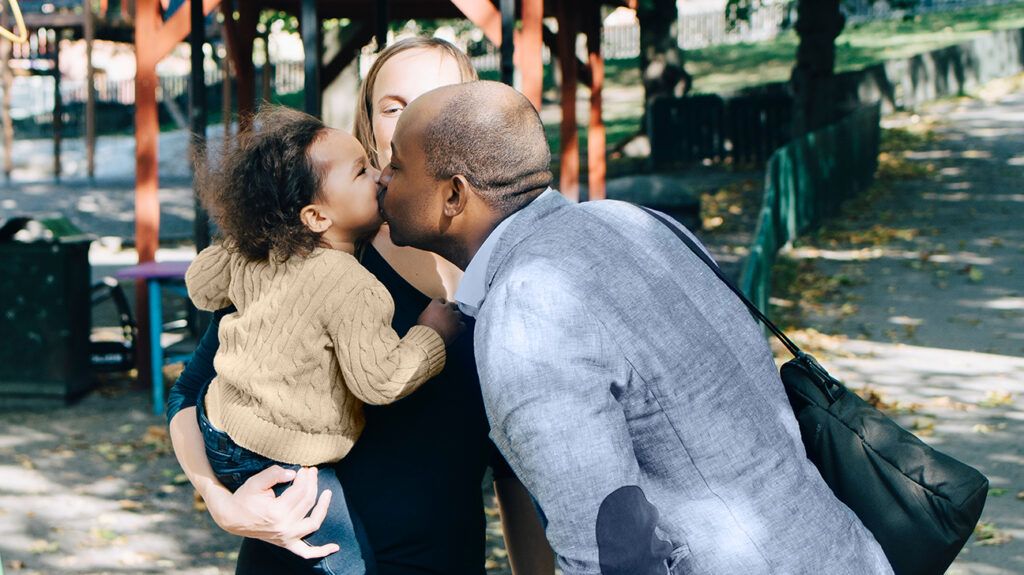A divorce may end your marriage with your ex, but your co-parenting relationship continues to affect your children — for better and worse.

Co-parenting means sharing decisions about the care of your children, including where and how they live, go to school, vacation, and more.
No matter what you feel about your former partner, finding ways to co-parent positively after a separation or divorce will likely be important to your children’s emotional and social well-being.
Post-divorce, your kids will be adjusting to significant changes, such as splitting their time between two residencies. You and your ex can work together, despite differences, to make these adjustments manageable.
Understanding the approaches that make co-parents successful is a first step to implementing positive parenting skills post-divorce.
Co-parenting or shared parenting means being like-it-or-not colleagues in the work of raising kids. When you’re separated or divorced, you parent together even though the two of you may be living apart or having romantic relationships with others.
Co-parenting might include agreeing to how much time a child spends on their phone or device, or developing a strategy for college applications. It involves collaborative decisions about how to care for your child.
A
- promoting the importance of yours and the other parent’s role in your kid’s life
- the importance of mutually investing in the child’s best interests
- dealing with conflicts between you, together
- finding a measure of healing and peace after separation
You might also be mindful of establishing and upholding co-parenting boundaries.
If you and your partner were married, you automatically get equal custody unless you work out a new custody agreement in court.
You can choose to work out a parenting plan with your ex privately without a Family Court hearing. You might consider things like how much time your child will spend with each parent and how you will handle holidays or extended family visits.
Here’s a free resource for custody timeshare templates you and your co-parent can use.
If one of you doesn’t follow the plan or if new partners enter the picture, you may choose family arbitration and still avoid additional Family Court hearings.
A cooperative, mutually respectful, communicative style works best for easing the strain of divorce on kids. You might also consider parallel partnering if your relationship with your partner is toxic or hostile.
Parallel partnering means you detach from each other and agree to spend time with your child, each in your own way.
A 2021 study questioned 251 Dutch adolescents from divorced families, inviting them to record their perceptions in response to a Co-parenting Behavior Questionnaire that measured:
- mutual respect, for example, how often parents say good things about each other
- degree of conflict, such as frequency of arguments and levels of hostility
- effectiveness of communication, including how often and peacefully parents communicate with each other
- presence of triangulation, meaning how often and intensely the teen feels caught in the middle
Four main co-parenting styles emerged in response to teens’ answers:
Cooperative
- infrequent arguing
- frequent compromise
- mutual respect
- low levels of triangulation
- high levels of communication
- agree to be parents for life
Negatively engaged
- lots of conflict
- but not necessarily disrespectful
- relatively communicative
Negatively disengaged
- lots of conflict
- little evidence of mutual respect
- poor or no communication
Average
- a mix of cooperation and conflict
The 2022 study cited above found that uncooperative co-parenting styles contribute to adolescents’ internal and external distress.
Internal distress includes:
External distress includes:
- aggression
- delinquency
A 2015 systematic literature review of 11 (out of 933 screened) articles, similarly found that conflict and disrespect between co-parents led to behavioral and emotional problems for children.
Both studies show cooperative co-parenting affects teens’ mental health of teens positively by:
- increasing self-esteem
- decreasing aggression
- decreasing delinquency
Do:
- practice open communication with your parenting partner
- develop a parenting plan
- arrange handoffs, rides to after-school events, exceptions for special occasions
- share necessary information about schedules, health, and other concerns
- keep your tone respectful whenever possible
- talk with your children — and actively listen
- let children know in advance where they’ll be staying for holidays and weekends
- give them an agreed-upon, age-level explanation of why you divorced
- let them know what you value in their other parent
- follow agreements with your co-parent about how and when to explain new relationships
Don’t
- expect your relationship with your ex to be conflict-free
- An online survey data collected from 430 divorcing parents in a
2019 study found that if parents don’t have positive parenting skills such as good communication, their alliance remains poor whether there’s conflict or not. (You can focus on what you can do or learn, not on conflicts you can’t avoid)
- An online survey data collected from 430 divorcing parents in a
- berate your co-parent or yourself for human mistakes
- overshare with your child
- practice or allow porous boundaries with your co-parent
- (this article recommends boundary-setting strategies, such as using a specific email address with your co-parent for discussion of kid business)
- hesitate to see a therapist if feelings about or problems with your ex overwhelm your best efforts
Divorcing means letting go of a relationship perhaps to find new love or at least increased freedom from harmful or hindering patterns. Interacting with your ex-partner may not be easy.
Co-parenting can be rewarding. But it’s a lifelong labor of love that you both endeavor for your kids.
